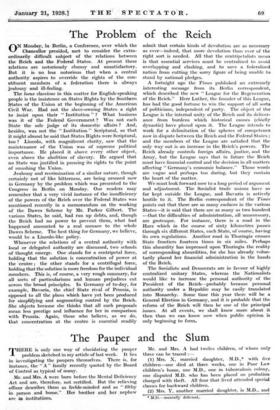The Problem of the Reich O N Monday, in Berlin, a
Conference, over which the Chancellor presided, met to consider the extra- ordinarily difficult subject of the relations between the Reich and the Federal States. At present these relations are notoriously clumsy and unsatisfactory. But it is- no less notorious that when a central authority aspires to override the rights of the con- stituent members of a federation there is always jealousy and ill-feeling.
The locus classicus in this matter for English-speaking people is the insistence on States Rights by the Southern States of the Union at the beginning of the American Civil War. Had not the slave-owning States a right to insist upon their " Institution " ? What business was it of the Federal . Government? Was not each State the sole judge of- its domestic affairs ? And, besides, was not the " Institution " Scriptural, so that it might almost be said that States Rights were Scriptural, too ? Lincoln, with magnificent clarity, saw that the maintenance of the Union was of supreme political importance. He placed it above every other object, even above the abolition of slavery. He argued that no State was justified in pressing its rights to the point of smashing the Union.
Jealousy and recrimination of a similar nature, though certainly not of like bitterness, are being aroused now in Germany by the problem which was presented to the Congress in Berlin on Monday. Our readers may remember that a very vivid instance of the insufficiency of the powers of the Reich over the Federal States was mentioned recently in a memorandum on the working of the Dawes Scheme by Mr. Parker Gilbert. The various States, he said, had run up debts, and, though the Reich had no power to prevent them, what had happened amounted to a real menace to the whole Dawes Scheme. The best thing for Germany, we believe, would be a Lincoln-like policy.
Whenever the relations of a central authority with local or delegated authority are discussed, two schools of thought emerge. One stands for a centripetal force, holding that the solution is concentration of power at the centre; the other stands for a centrifugal force, holding that the solution is more freedom for the individual members. This is, of course, a very rough summary, for all sorts of particularisms and human prejudices cut across the broad principles. In Germany of to-day, for example, Bavaria, the chief State rival of Prussia, is Opposed to all the plans which have yet been produced for simplifying and augmenting control by the Reich. She objects because she thinks that all such proposals mean less prestige and influence for her in comparison with Prussia. Again, those who believe, as we do, that concentration at the centre is essential readily admit that certain kinds of devolution are as necessary as ever—indeed, that more devolution than ever of the right sort is needed. All that the centripetalists mean is that essential services must be centralized to avoid overlapping and clashing, and to save a federalized nation from cutting the sorry figure of being unable to stand by national pledges.
A fortnight ago the Times published an extremely interesting message from its Berlin correspondent, which described the new "League for the Regeneration of the Reich." Herr Luther, the founder of this League, has had the good fortune to win the support of all sorts of politicians, independent of party. The object of the League is the -internal unity of the Reich and its deliver- ance from burdens which historical causes (chiefly dynastic) have placed upon it. The League intends to work for a delimitation of the spheres of competence now in dispute between the Reich and the Federal States ; and the members of the League are satisfied that the only way out is an increase in the Reich's powers. The Reich already controls foreign affairs, justice, and the Army, but the League says that in future the Reich must have financial control and the decision in all matters affecting "Germany's economic balance." Those words are vague and perhaps too daring, but they contain the heart of the matter.
We must look forward now to a long period of argument and adjustment. The Socialist trade unions have so far kept outside the League, and Bavaria is actively hostile to it. The Berlin correspondent of the Times points out that there are so many enclaves in the various States—it is said that there are as many as two hundred —that the difficulties of administration, all unnecessary, are grotesque. For instance, there is a road in the Harz which in the course of sixty kilometres passes through six different States, each State, of course, having its own regulations. Another road in Thuringia crosses State frontiers fourteen times in six miles. Perhaps this absurdity has impressed upon Thuringia the reality of corresponding absurdities, for she has already volun- tarily placed her financial administration in the hands of the Reich.
The Socialists and Democrats are in favour of highly centralized unitary States, whereas the Nationalists would like to increase the personal authority of the President of the Reich—probably because personal authority under a Republic may be easily translated into Monarchy. Some time this year there will be a General Election in Germany, and it is probable that the reform of the Reich will then be one of the principal issues. At all events, we shall know more about it then than we can know now when public opinion is only beginning to form.






































 Previous page
Previous page